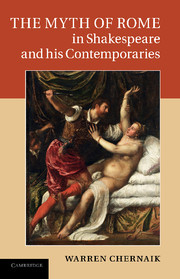Book contents
- Frontmatter
- Contents
- Acknowledgements
- Introduction: a Roman thought
- 1 Roman historians and the myth of Rome
- 2 The wronged Lucretia and the early republic
- 3 Self-inflicted wounds
- 4 ‘Like a Colossus’: Julius Caesar
- 5 Ben Jonson's Rome
- 6 O'erflowing the measure: Antony and Cleopatra
- 7 The city and the battlefield: Coriolanus
- 8 Tyranny and empire
- 9 Ancient Britons and Romans
- Postscript: Shakespeare and the republican tradition
- Notes
- Bibliography
- Index
4 - ‘Like a Colossus’: Julius Caesar
Published online by Cambridge University Press: 29 March 2011
- Frontmatter
- Contents
- Acknowledgements
- Introduction: a Roman thought
- 1 Roman historians and the myth of Rome
- 2 The wronged Lucretia and the early republic
- 3 Self-inflicted wounds
- 4 ‘Like a Colossus’: Julius Caesar
- 5 Ben Jonson's Rome
- 6 O'erflowing the measure: Antony and Cleopatra
- 7 The city and the battlefield: Coriolanus
- 8 Tyranny and empire
- 9 Ancient Britons and Romans
- Postscript: Shakespeare and the republican tradition
- Notes
- Bibliography
- Index
Summary
FRIENDS, ROMANS, COUNTRYMEN
The words ‘Rome’ and ‘Roman’ recur throughout Julius Caesar, as they do in Titus Andronicus, but here the terms generally carry an ethical import. ‘Noble/nobly/noblest’ is attached to ‘Roman’ six times, including the celebrated epitaph on Brutus, ‘This was the noblest Roman of them all’ (5.5.69). In one speech in 5.3, Brutus uses ‘Rome’ and ‘Roman’ in three successive lines, each of them associating Rome with standards of conduct, seen as remaining applicable even in dark times. Brutus here pays tribute to Cassius and Titinius, both of whom, taking ‘a Roman's part’, have committed suicide on the battlefield.
brutus. Are yet two Romans living such as these?
The last of all the Romans, fare thee well:
It is impossible that ever Rome
Should breed thy fellow.
(5.3.89, 98–101)Throughout the play, ‘Roman’ is a highly charged term implying possession of moral qualities – constancy, fidelity, perseverance, self-discipline, respect for tradition, a sense of honour – or a claim that others lack such qualities.
In Act I, nearly all mention of ‘Rome’ or ‘Roman’ has persuasive intent, used by enemies of Caesar to evoke a tradition of republican independence and self-reliance, while pouring scorn on those who fail to live up to these ideals. The tribunes Flavius and Murellus, loyal to the defeated Pompey, are contemptuous of the populace who ‘make holiday to see Caesar and to rejoice in his triumph’.
- Type
- Chapter
- Information
- The Myth of Rome in Shakespeare and his Contemporaries , pp. 79 - 107Publisher: Cambridge University PressPrint publication year: 2011



